Ei Mei Kan - September - 2017
Chopping Tomatoes in Kazakhstan
by Alexander V. Gheorghiu
Imagine suddenly waking up far away from home, far away from the familiar, with people you don’t know, who are speaking a language that you don’t speak. Well, reader, the circumstances of such an event are seemingly unlikely, and entirely moot, therefore not even worth pursuing in the abstract realm of daydreams. So, imagine my surprise when I woke up to find that I had fallen into the rabbit hole and popped out somewhere at the base of a mountain range overlooking a glittering city in a country I could not have identified on a map.
Ei Mei Kan Dojo (Birimingham, UK) has existed for almost thirty years; and during this time, many odd characters have blown through the doors. Generations of my seniors, who come from every corner of the world, every size, and every shape, but none have been quite so strange, or quixotic, as the two I found with me: Izram Ali, and Fero Slamenik. The mad-hatter in this adventure was of course none other than our teacher Chris Mooney Shihan. (For my own safety let me clarify that any statement indicating the odditites of characters found in the dojo do not include any Rokkudans or Shihans)
Allow me to retrace the steps which took us so far away from the comforts of Indian takeaways, right hand drive, and an endless stream of lascivious media, in a comfortable city on a pokey island somewhere on the western side of Europe. Our journey to Kazakhstan began at Birmingham International Airport on the 3rd of July 2017 with a 10:35 flight to inter-continental Istanbul. In Byzantium, at a café during a four-hour layover, we were discovered by a Greek by the name of Yiannis Zorgianos (Shu Ren Kan, Greece), who decided to join us on our expedition. A long flight later we arrived in the country of anticipation at 05:25, received our immigration cards, crossed the border, collected our bags, and exited.
As we passed the threshold I reflected on our purpose of our trip. Many years ago, there was a teacher by the name of Viktor Trusov who founded a dojo in a school in Almaty, then the capital of Kazakhstan. It was a permanent dojo where students from both Kazakhstan and Turkmenistan would live, and in those days, be fed by the teacher. Trusov Sensei had heard of Chiba Shihan’s work and wanted to join his school so he made his way to the south of France where the master was teaching a seminar. Subsequently, he made his way to San Diego with two of his students, Oleg Agibalov and Dimitry Kakotkin and they became uchi-deshi. When they returned they brought Chiba Shihan’s work back with them.
My own teacher’s involvement in Kazakhstan began in 2001 with a seminar, though he had met Trusov Sensei when he came to France. Mooney Shihan later returned in 2003 with Gabriel Valibouze Shihan, who was the first of Chiba Shihan’s students ever to teach in the country some years prior. Over the next decade several different Birankai teachers made the journey, and in 2007 the Kazakhs invited the dragon himself. Sadly, due to ill health Chiba Shihan was unable to go, so he sent Sensei in his place. At the same time another student of Trusov Sensei, Sergei Sobbotin, left his teacher and went to see Chiba Shihan in San Diego, USA. He too became uchi-deshi. Finally, at a seminar in Israel in 2010, to which the Kazakh’s attended, Chiba Shihan told Sensei he was to take responsibility over Kazakhstan. Ever since then Mooney Shihan has been travelling to the country once a year, sometimes twice, to support the aikidoka there. Currently in the ninth largest country in the world there are four Birankai dojos, meaning some of them are as much as two days apart.
Immediately as we passed the threshold we were greeted by our hosts for the next week: Oleg Agibalov, Dimitry Kakotkin, Sergei Sobbotin, Yermek Daytov, and Anton Kosarenko. We had a short introduction and, between eye blinks, were separated into two cars: the deshi in one, and the teachers in the other. This was not unexpected, though it was inconvenient as our Russian was limited to the top shelf at a bar and it turns out that 'Smirnoff' does not in fact mean anything. The cars drove forward into the unknown former capital.
The first observation we made, indeed before we had even landed, is how beautiful the city is. It sits in a bowl with a largely flat base and shear snow-capped mountains forming a rim. The second observation is that Kazakhstan in not a desert or forgotten vestige of humanity on the edge of the world. There are people, plants, and buildings here in a rich variety. Who would have thought? Finally, it was hot. Part of this is unique to Almaty as the Altau mountains lock in whatever climate there is resulting in extraordinarily hot summers and cringe inducing cold winters.
We drove for around an hour when the buildings began to thin out and our elevation began to increase. Having been stunned by the vistas it suddenly recurred to us that we did not in fact know where we were going. We had been in such a rush to drive on due to delays at border control that we hadn’t had the plan laid out for us, not that we had much agency at that moment in time anyway. A short while later we stopped in front of a compound with a high yellow stone wall and thick metal doors.
We entered the courtyard, which was big enough to have a quite satisfactory dojo, and took our bags up the entrance stairs into a stately house. It was a simple but well cared for home with few furnishings, and a quite comfortable atmosphere. It was then time for a proper introduction, and for the teachers to speak about all the transpirations since Sensei’s last visit. We sat down in a high-ceilinged room with long red curtains and chair lining the walls creating an open space for an intricate square carpet. Sensei and Sobbotin Sensei were particularly communicative in speaking about a year’s worth of dealings, with Yermek Daytov and Agibalov Sensei carefully processing. Neither of those men spoke much, but they were very perceptive and whenever they did speak, at any point during the week, a careful silence covered the audience.
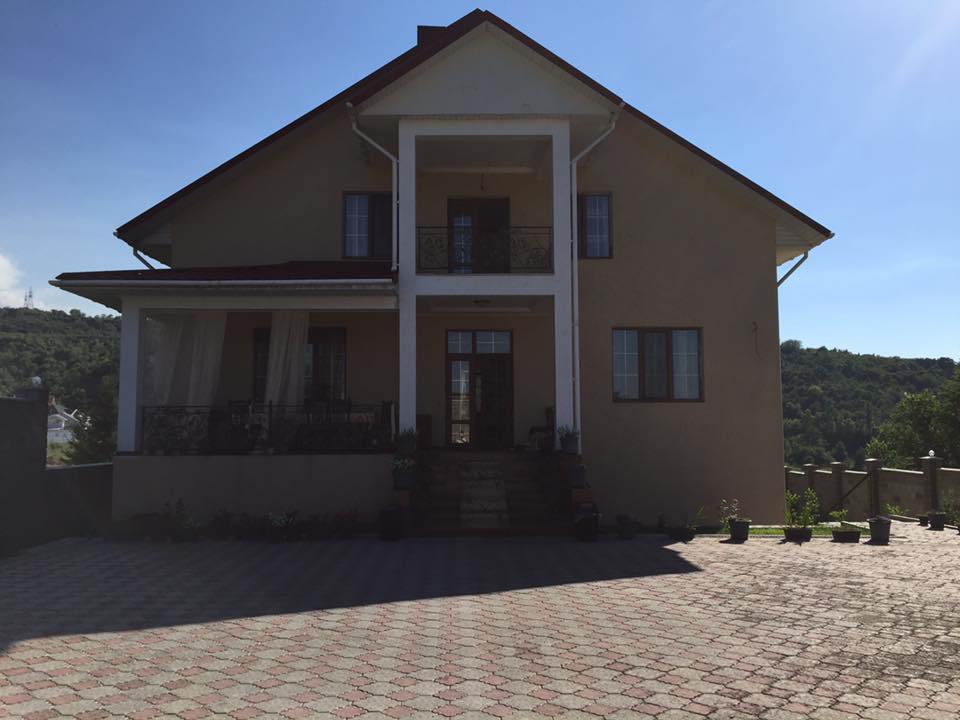
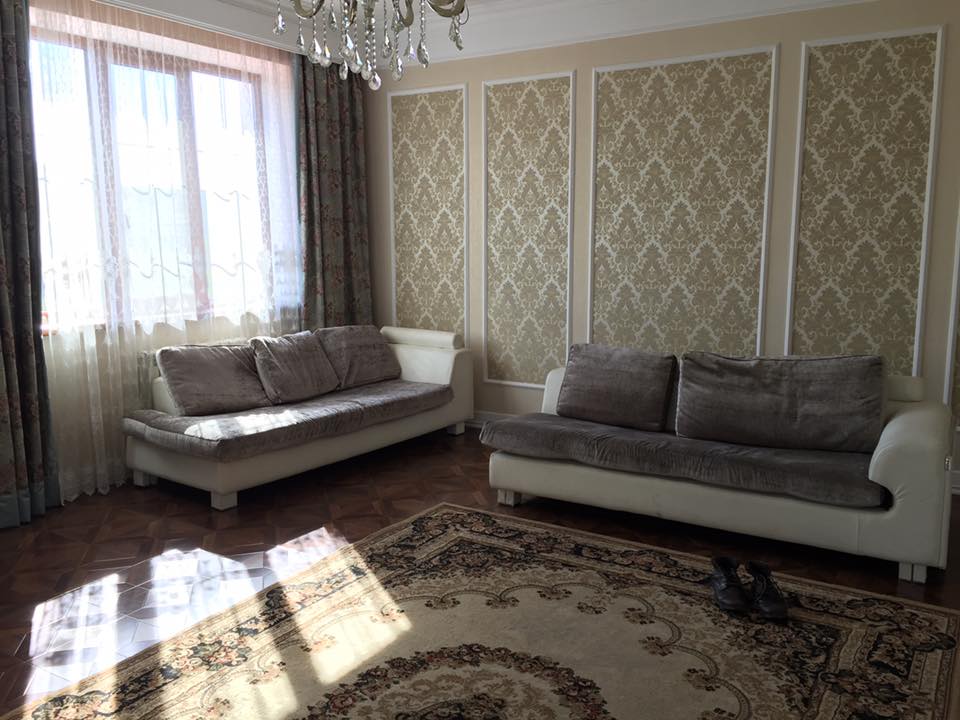
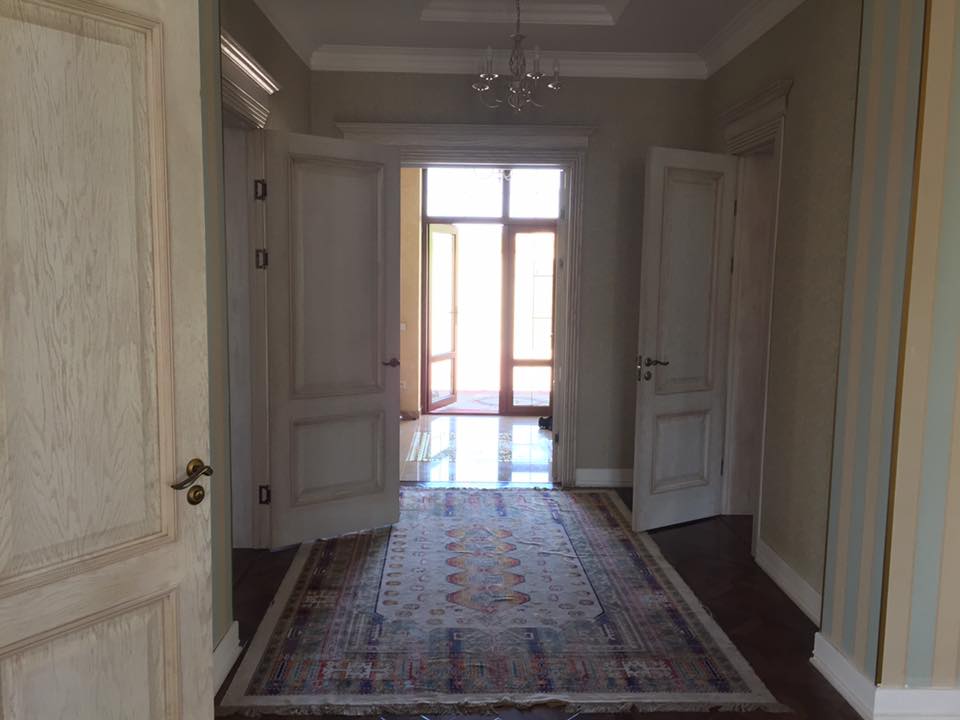
Oleg Agibalov Sensei is the most senior Aikidoka in the organization in both age and training as the only Yondan in the country, and he is well respected. He is Russian-Kazakh, short with broad shoulder, strong build, short white hair, and a persistently quiet and kind expression. In Aikido, he is like a cloud; no force is required to work with him, only good tai-sabaki.
Sergei Sobbotin Sensei is younger than Agibalov Sensei, and is Sandan in Aikido. He too is Russian-Kazakh, but big and formerly trained in Systema meaning his whole body is completely soft until he needs it to be solid. He is open and has the kind of laugh that jumps out of the body and infects the listening crowd.
Yermek Daytov is affectionately known by Sensei as the horse-man. In Kazakh culture, the horse is a respected animal and though Yermek is only Shodan in Aikido he was elected the President of the organization due to the care and balance with which he handles himself. He is native Kazakh and has the typical thick darker skin, jet black hair, and dark eyes.
Anton Kosarenko is the youngest of the hosting group, he is the secretary of the organization, Ikkyu in Aikido and a student of Sobbotin Sensei. Exceptionally tall he gave me quite fright when he came up to us at the airport, but he is open, friendly and always ready to help.
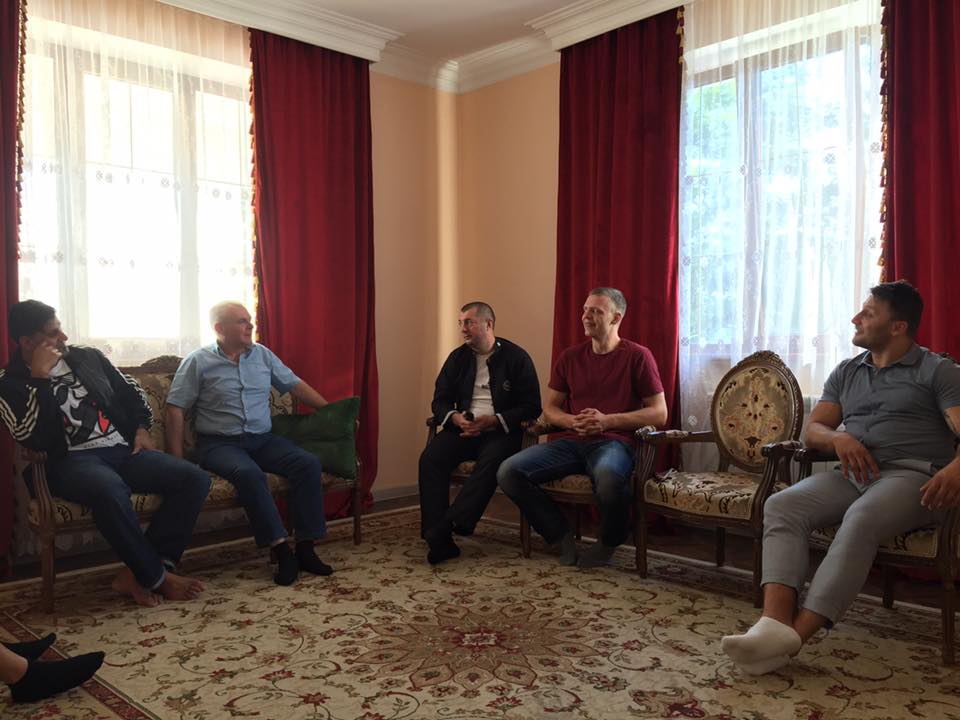
The meeting was followed by a breakfast of porridge and our first cups of delicious black tea. A strong infusion is poured into little white bowls and then diluted with boiling water until half-full to form a steaming elixir. Later we learned that in Kazakhstan the bowls are always served half full, until the host wants to suggest that it is time to leave at which point they will give you full bowls instead. The irony in this tradition is a good indicator of the ingrained hospitality of the culture.
It was around 08:00 and long after our bed time. Our hosts left and we slept for a few hours. When we woke up, the Kazakhs were back and armed with wonderful grapes, apricots and dangerously tasty apples. These were all cast in shadow though, quite literally, by a watermelon the size of a stool or a small child which was full of ambrosia.
It was lunch time. We got into the cars and drove to a restaurant where we were introduced to our first taste of the local cuisine. It was a simple plate consisting of noodles with a ragu and a side of salad. The dish was served with a side of doughy bread and a side of another salad. On the other side, we had a small plate of gyoza and some glutinous rice with beef. A small affair. To drink there was a juice-cum-tea served in pint glasses. This beverage is prepared by boiling fruit until all their juices run out and then reducing the liquid into a delicious, sticky, sweet nectar.
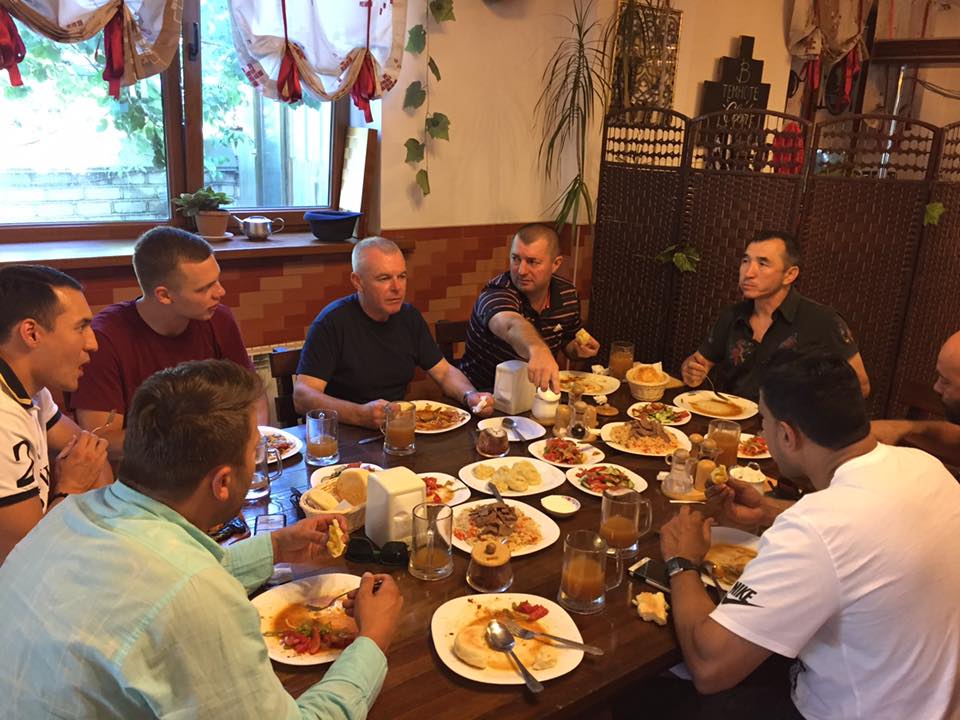
To aid digestion we followed this snack with a little walk up an 843-step incline. I must confess that there is perhaps no better way to rouse the body than such an exertion, although I would recommend a slower recharge after a transcontinental journey in the future. So, this was to be the character of our visit? Strength and endurance? No matter! We are tough and will persevere.
At the top: the raw ferocity of nature carved in rock. The progress of epochs of war between the elemental spirits who dominate the central asian subcontinent. A valley splitting green mountains which ran into the distance as far as our eyes could follow them like giants from the land before time. On, on and on. The kingdom of the kami of Kazakhstan. My prejudice was firmly shattered at this quick slap of nature. Prose is limited in this aspect so it must be stated clearly, and not overlooked, that our feast and pilgrimage wasn’t extremism for the sake of extremism, those steps were a stairway to heaven. All this wondrous grandeur showcasing nature’s most luscious power was... a ski resort: closed for the summer.
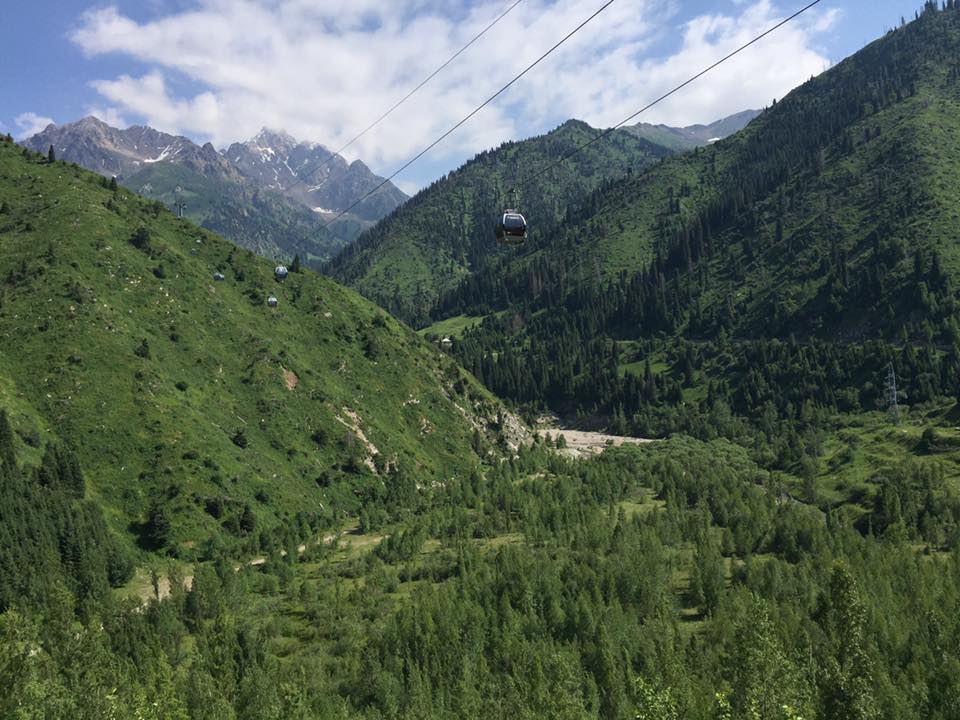
Heaven aside, we were still tired, therefore got back into the cars which returned to the house where we rested some more. This time when our hosts returned they had with them fire-arms: a grill, wood, meat, and vegetables. We all joined in the preparations with some preparing the grill, and others preparing serving plates of vegetables, laying the table, and finding drinks.
It was like waking from a stupor. I suddently realised the vivid context of the alien land, and alien people with their alien culture, and the mundanity of the task before me. Not mundane in the pergoative sense, but in the common place sense. I was chopping tomatoes in Kazakhstan. Until a few months ago I must admit that I had never given the country a second’s thought, and in all honesty, would not have been able to point it out on a map. I know nothing about this place. Here I am.
Izram, Fero and I are preparing three serving plates of gherkins, tomatoes, and peppers, laying on top whole dill and parsley bunches. Meanwhile, the others are preparing the meats, tableware, and start the fire. There is a big metal container at the end of the table, once the fire is ready they take long skewers of lamb and liver from it and lay them on the grill. When they return, the air is instantly filled with umami and thick with the delicious scent of good food. We salivate. The meat and vegetables are simple enough to eat, but the herbs are confusing. We see Sobbotin Sensei take a whole strand and wrap it around two of his fingers, and then put the whole thing in his mouth. Contrastingly, when I have eaten these herbs in the past in the luxorious surrondings of student accomodation they have been finely chopped up with a sharp knife. This new rustic method is a remarkable way to eat the product as your whole mouth is filled with the flavor which then lingers on your palate for your next bite of lamb.
Alongside the food we have more tea and a sweet beer which comes in two-liter plastic coca-cola bottles. They notice our quizzical look and explain to us that in Kazakhstan it is quite common to buy these recycled bottles of draught beer from the pubs so that you can consume the product at home, or at a party, at your own leisure. There is also a smooth cognac and, of course, vodka – our Russian finally getting some exercise. It is crucial to understand that by vodka I mean something quite different from the gag inducing paint stripper found in most shops in Britain. This is a strong yet entirely unobtrusive clear liquid which flows without much resistance at all. Moreover, it is cheap enough to come out of the taps, a bottle of the paint stripper typically costs three to five times as much.
At some point the singing started. More meat came out. More drink was found. Before the next bite two bottles of the Russian water, the whole cognac and four of the beers had vanished. The clocks were drunk and had stumbled forward haphazardly.
The final part of our group arrives at this later hour, Sadek Khettab Sensei (Aïkido Strasbourg Eurométropole, France) with his student Olivier Nebinger and our hosts leave us till the morning. The Kazakhs are a very hospitable people so there is enough food for a village left and the French cohort get to try the wonderful plates. Sensei and Khettab Sensei catch up, and then bed time. The French are tired from the journey and we have another leg of the journey tomorrow.
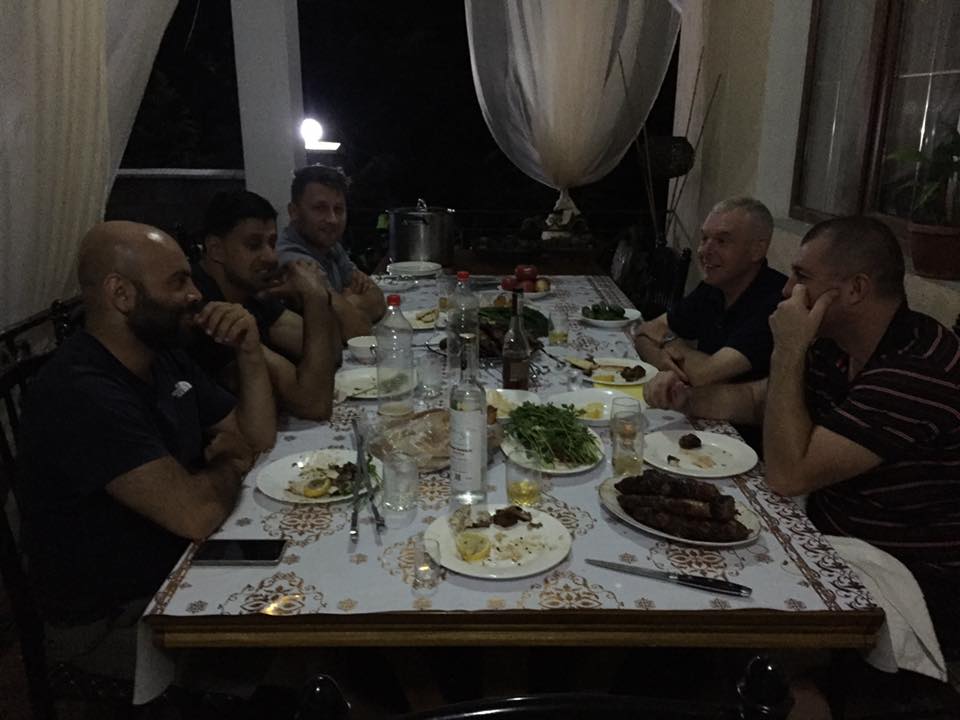
Wake up. Get ready. Pack the bags. Get in the cars. Go! We are on a four-hour drive across the south of the country to the small village of Tekeli where the seminar is going to be. The car is big and comfortable, but nonetheless the prospect of such a long journey is terrifying. I look out of the window and my consciousness disappears into the view before me.
The landscape is a vivid Van Goth of burnt green massifs establishing the undulating Stepp which paces into the ancient Himalayas… or something to that effect. Kazakhstan is vast, it is raw and it is modest in both nature and culture, to write about it with such adjective saturated prose is an injustice. Nonetheless, the window does frame the aforementioned Van Goth, but it isn’t what captivates me. The colours I have seen before, and structurally what is impressive is how big and flat the land is running far into the horizon where at the last instant mountains stick straight up. Even this I have elsewhere. Instead, let me describe this alien place by linguistic contrast. In Britain birds fly, distances are long, and the sky is blue; in Kazakhstan birds soar, distances stretch and the sky is azure. How does one capture that? This earth is alive and pulsing, with mountain ranges as veins and arteries pocking through a thick skin with deep seams of explosive coal and natural gas; the culture is ancient and descendent from nomads whose ghosts still wander and wonder at the unscratched surface of the open heaven above; and we are nothing, a small bug passing up the arm of this creature.
.jpg)
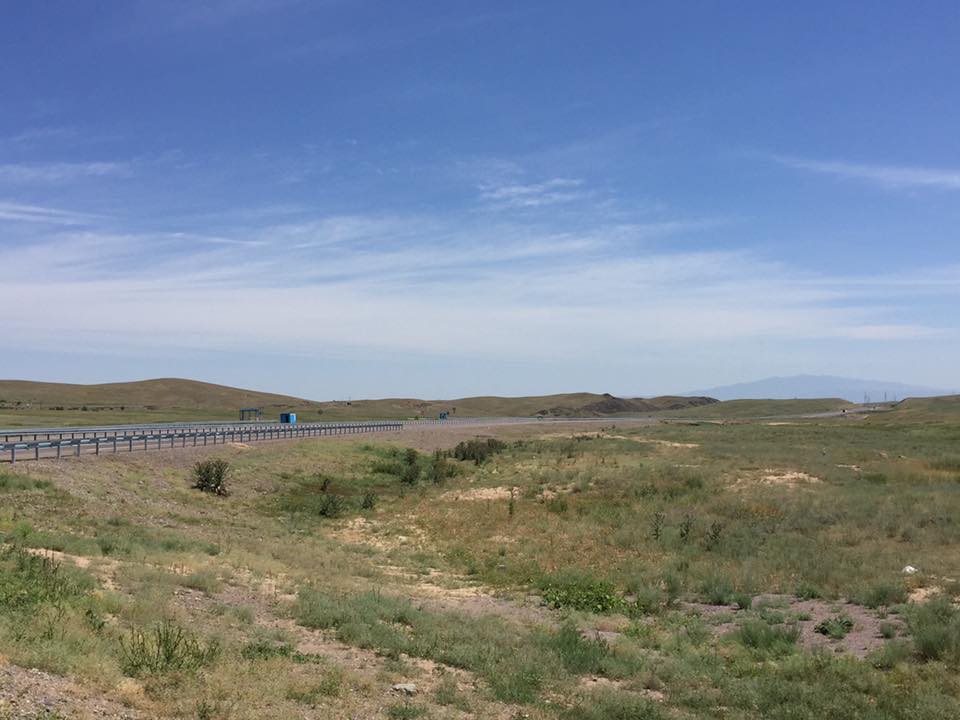
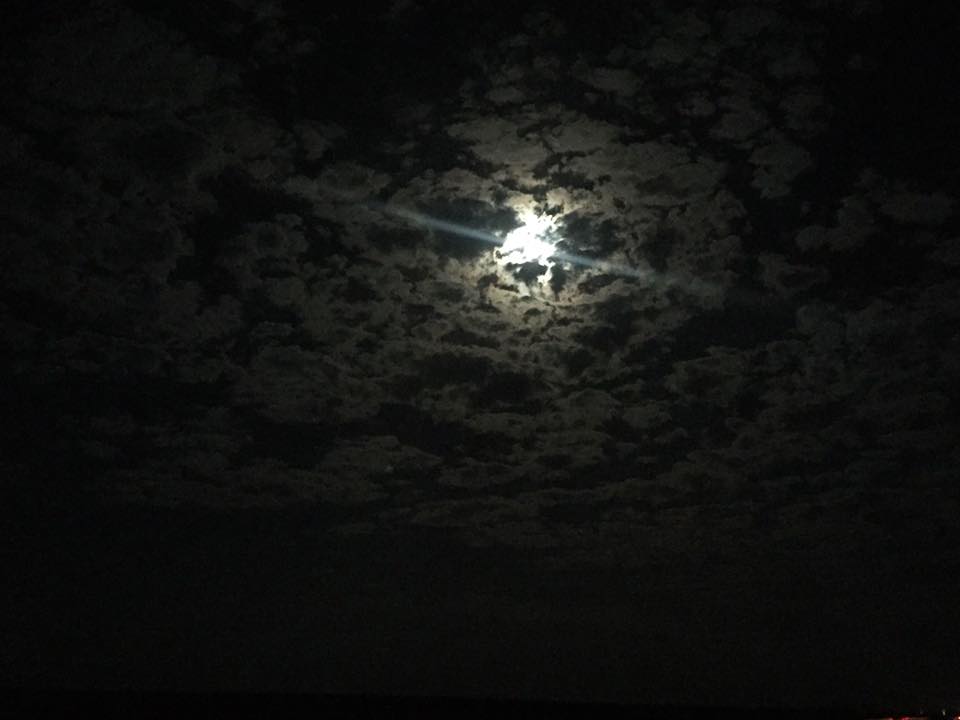
In the village of Taldykorgan we stop at the house of Biysen Kuranbek who is the Vice President of the organization. He is native Kazakh with a large broad build and quiet searching eyes. By day he is chat-show host, but he is as quiet and careful with his speaking as Agibalov Sensei and Yermek. Biysen and his wife receive us. Their house is beautiful, with an impressive courtyard leading up to a white bungalow. We take our shoes off on the steps and walk into a wide hallway which leads to the living area and dining room where the table is set for sixteen. On the wall Biysen has a vibrant eye-catching photo of an elderly Kazakh woman and a baby. He explains to us that in Kazakhstan it is traditional for the eldest child to be given to the grandparents to be raised by them. This photo is him with his grandmother.
The hosting family are aware of Sensei's passion for music from every culture, and it happens that Biysen’s brother is one of the top musicians in the country. His sister and brother-in-law are excellent artists too. They play several songs showcasing a variety of traditional instruments, including the dombra which looks something like a lute with a long neck. There are approximately only 150 people in the world who can play this instrument and two of them are in the room. The Kazakh singing song has long sonorous notes which are thick in the air and pull out memories and emotions from a well deep within. They sang many songs, song which will not leave you alone.
The dinner table is full of colour, and delicious canapes, but what shocks us most is the main course which comes to the table in huge ramakins, consisting of lamb and potato which have cooked and infused for hours. The potatoes are like blocks of butter and the lamb, which is every part of the lamb, falls apart with the tiniest touch. Finally: the head. They put this plate in front of Sensei and it was a bizarre sight with its tongue hanging out for comedic value. Biysen explains the traditions involved; the first cut is always the left ear and it given to the youngest member of the house so that they may listen better. The other parts such as eyes are then offered to respected members around the table and the head is shredded including the brain which is scrambled. This plate is passed around the table and everybody takes a small amount.
We also had the opportunity to try Kumis, a drink made from fermented horse milk and sparkling water. It is slightly bitter, slightly salty and slightly alcoholic which surprised us as Kazakhstan is a Muslim country. In other words, Kumis is nothing like the still sweet product that the word milk might suggest. There is a legend that if you drink this lactate twist on a gin and tonic every day you will live to be a hundred years old.
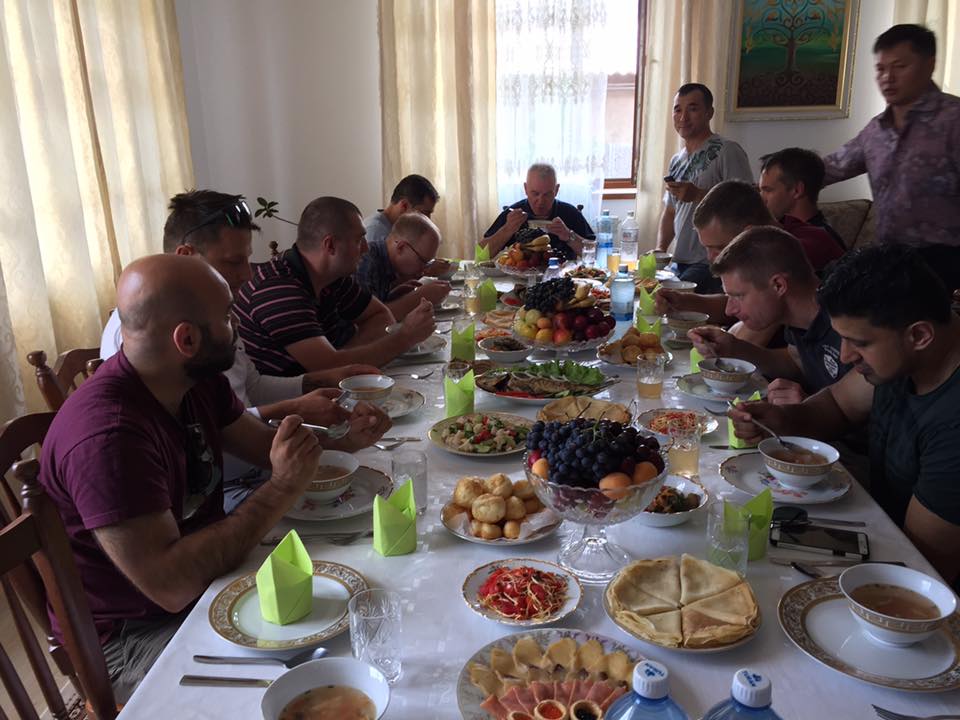
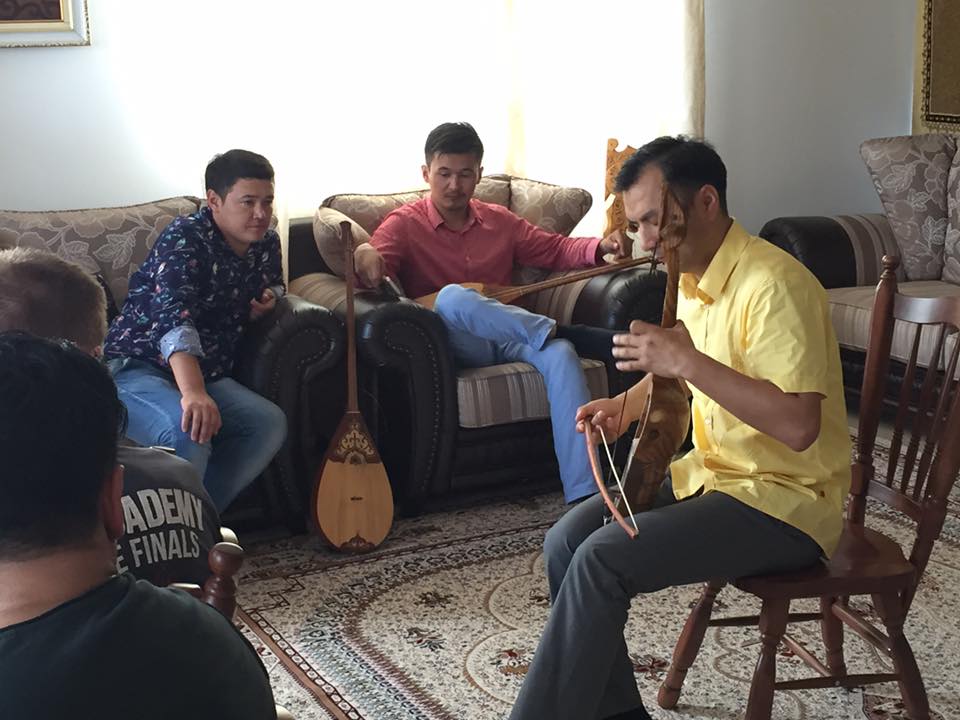
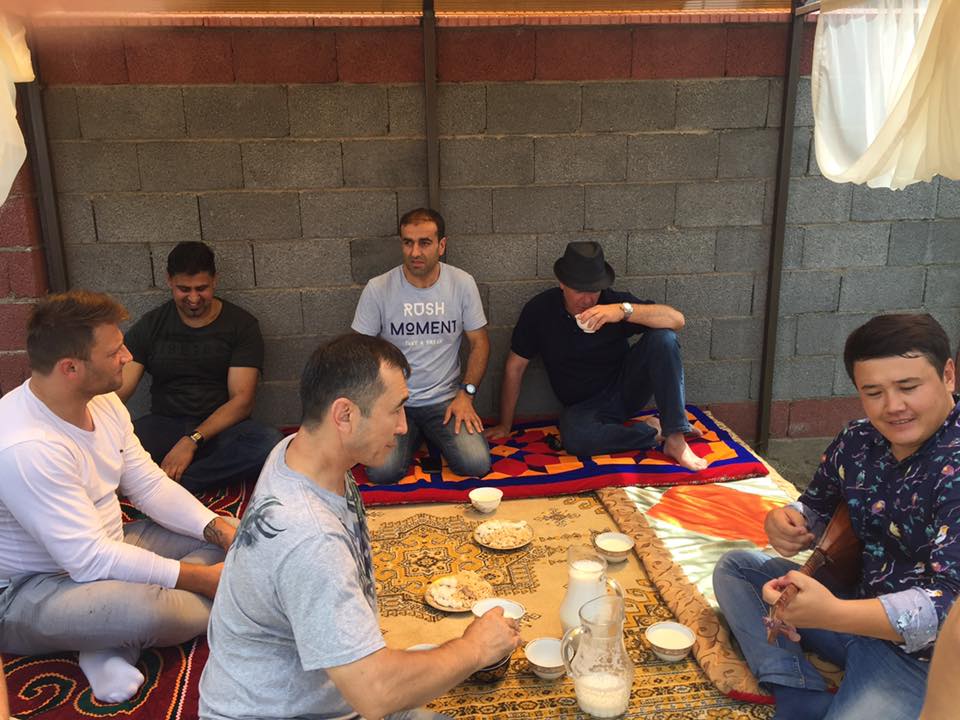
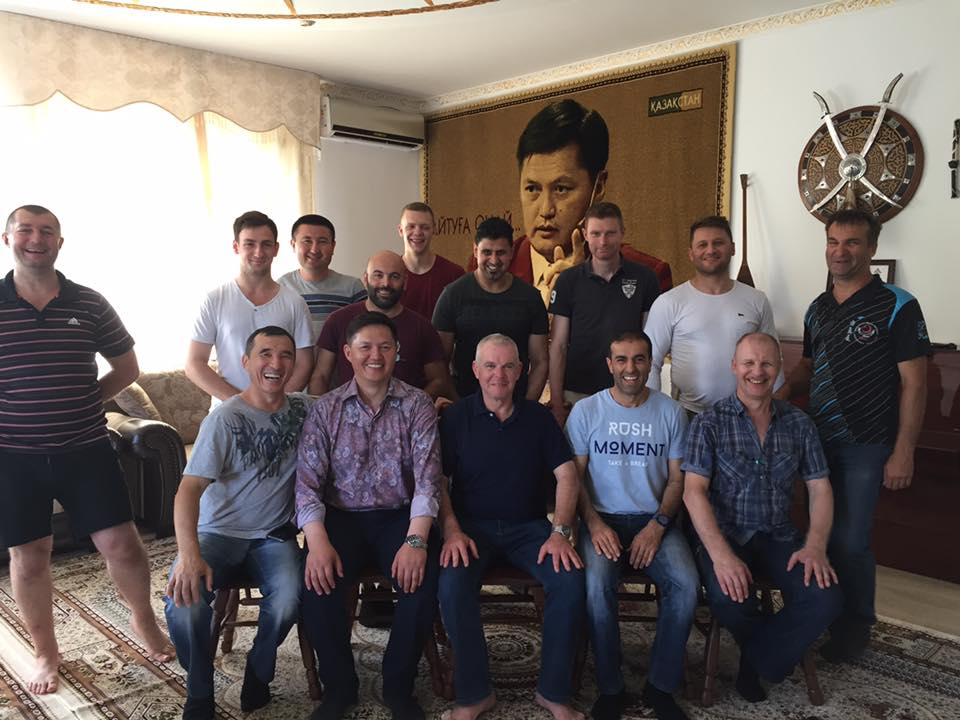
Time marching ceaselessly, we drive on. During the lengthy ride, we have a few breaks to stretch our legs, and at the end of our journey we stop at a local spa. After a long drive, this is a great way to recover, with ice cold showers and a hot sauna. In between bouts we sit and drink herbal tea. Sobbotin Sensei noticed my tense shoulders and kindly offers to help me. “Bend your knees.” He instructs as he walks behind me. “No, not that much you’ll collapse.” Before I have time to get the “What do you –“ Bang. A demonstration of Systema’s power right on my shoulder making me question several life decisions which conceivably led me to this point. Bang. A second strike on the other shoulder. “Turn around.” I follow reluctantly. As I make the turn I am sure I caught a faint smile on Sensei’s face. Two more strikes follow on the front. Sobbotin Sensei laughs. “Give it ten minutes, you’ll feel better.” This was true. I did feel better. Though internally I still questioned the necessity of such a rough program for relaxation.
I had further lucrative exchanges with Sobbotin Sensei at the same place. Fresh out of the sauna he asks me to whip his body and is initially disgruntled that I am too gentle. Later, I hear a new instruction: “Punch me.” I laugh hoping, desperately, that he is joking. “Hit me.” He repeats, so I softly tap him on the stomach. “Come on! Hit me.” I punch with minimal force. “I show you.” He says in exasperation. Bang. It turns out he wanted me to hit him. Again, I am sure I saw a faint smile on Sensei’s face out of the corner of my eye. “Now you get me back!” He laughs and this time I don’t feel so hesitant. As my fist approaches, I see his stomach deform and point in the direction of the attack and then the contact is hard. “Keep going!” He instructs. Not wanting another demonstration, I repetitively punch from many directions and each time his stomach points at the fist. This is the power of systema. Generously, Sobbotin Sensei gives me an opportunity to try it out. “OK. Now you!” The invitation comes. However, cautious that the punches I am about to receive may ‘knock me over’ I am told to put my back to the wall. Three. Two. One. Ouc- He didn’t hit me.
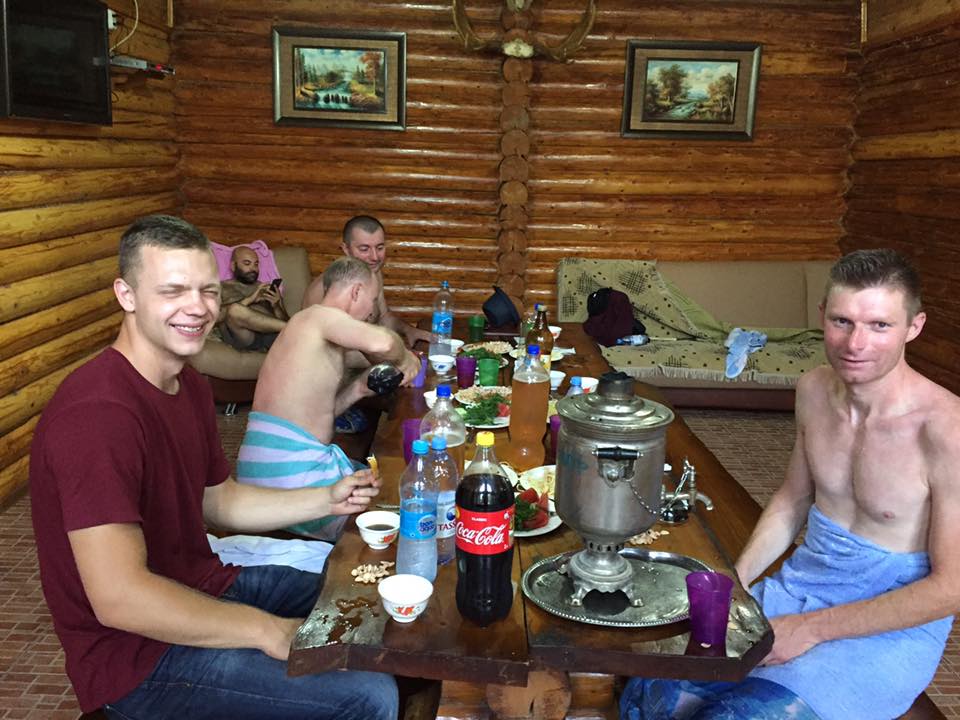
We finally arrive at the hotel. Each door opens into a small hallway with four rooms: a bathroom, a toilet, and two bedrooms. Each bedroom contains two beds, Khettab Sensei and his student Olivier in one, with Izram and Fero in the adjoining room, and in a separate hall is Yiannis and myself with Anton and Sasha, the treasurer of the organization, as our neighbors. Sensei is on the floor above in his own private room away from the riffraff. The lodgings were modest, but a good size for us and we had a balcony which allowed us to dry our keikogis over lunch.
The food is homely: for breakfast, there is porridge; and for lunch, and dinner, there is a traditional soup and then a main course, usually a variety of noddle dishes or stews, with salad. To drink there is always tea ready, but not water, and no coffee as it is rarely drunk in the country. The French contingent found this disheartening, but eventually some was procured.
Everyone eats together at a variety of four and six-person tables. During one lunch Sobbotin Sensei comes up to us and admonishes his students, Anton and Sasha, for not sitting straight and then puts an apple on their heads to ensure they keep correct posture.
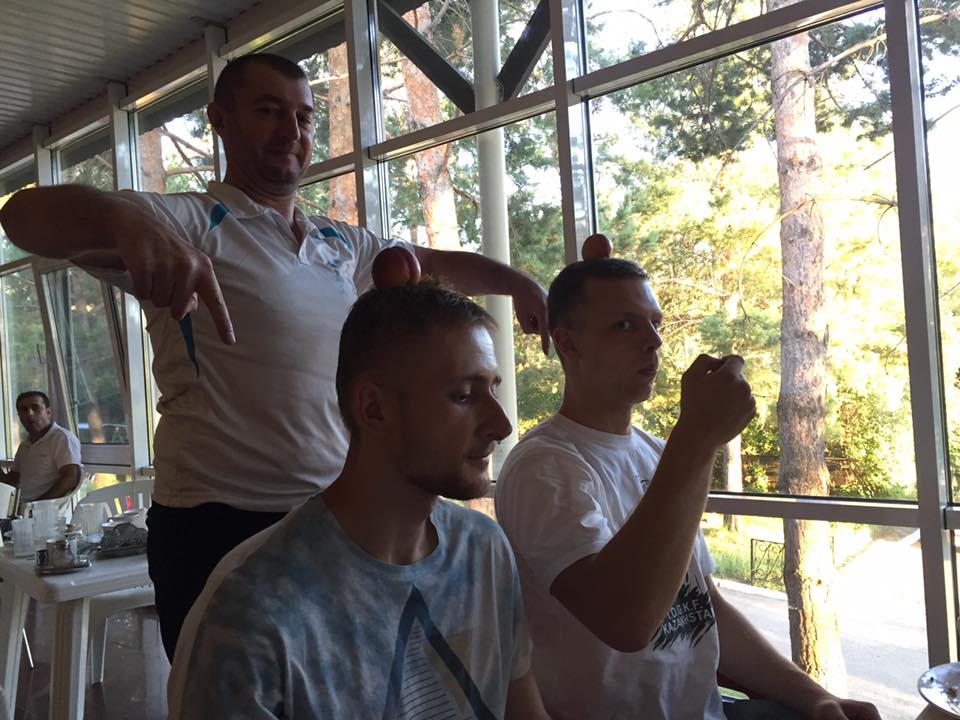
Each morning and lunch we take the fifteen-minute walk to the dojo, which initially doesn’t seem a lot, but in the scorching heat of the central Asian sun I assure you it is a lot. The teachers and seniors drove. We walk past a little shop in which we pick up some cool refreshing beer on our return in the evenings.
We are on such a walk when Anton and Sasha ask us about some of the difference between Kazakhstan and Britain. We tell them that this country is cheap for a Westerner, which doesn’t surprise them, but the extent is laughable. For example, seven liters of high quality draught beer from the local bar cost approximately £4 in Tekeli. Contrastingly, in parts of the UK this would barely suffice for half a liter of the most basic brand.
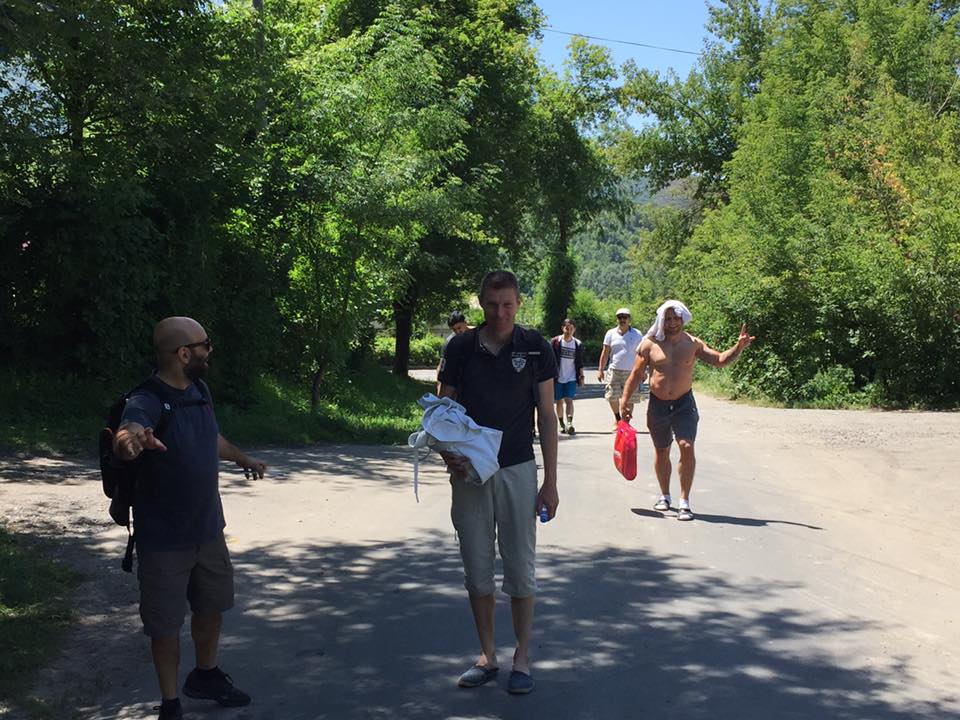
The dojo is big and spacious with tall windows in every direction. The mat is big and split into two yellow squares by a frame of blue. As we enter we are immediately impressed by the number of children which are there. It was also clear that there was not a single woman on the mat, not a single woman training in Aikido. This is not by choice of the organization, it is a cultural problem. Some women train in Karate, but martial arts in general is too masculine, and full body contact is discouraged between the genders.
The structure of the seminar is simple and effective. In the morning, we have three body art classes, first one taught by one of the Kazakh teachers, then a class by Khettab Sensei and finally a class by Mooney Shihan. In the afternoon, we have two weapon classes, a bokken class and a jo class, both taught by Sensei. Usually for this the class would be split and Khettab Sensei, or Izram, would work with the juniors while Mooney Shihan worked with the seniors. Some of the body art classes were also split, and occasionally teachers were taken outside for a small and more focused class with Sensei. Yiannis taught body art on the final afternoon.
Mooney Shihan’s theme for the week was made very clear from the start. The importance of kihon, the importance of getting the basics right, otherwise Aikido becomes dancing or as Chiba Shihan once wrote ‘a living yoga.’ Out of the three body art classes that Sensei taught there was honestly not much nage, and in one class there was none. This one was the most intense of the week, simply developing the basic tai-sabaki: irmi, tai no henka, irmi soku, uchi-kaiten, and ushiro tenkan. This summer I have followed my teacher to three different summer schools, he taught the same class each time, he teaches the class every year in his dojo, and each time it is extraordinarily revealing.
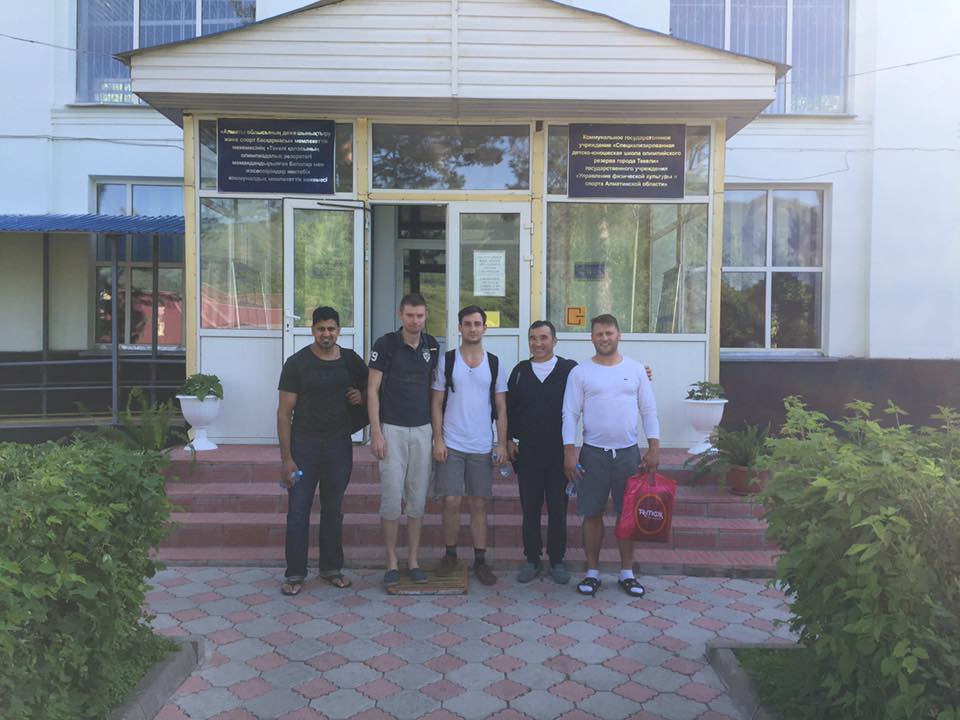
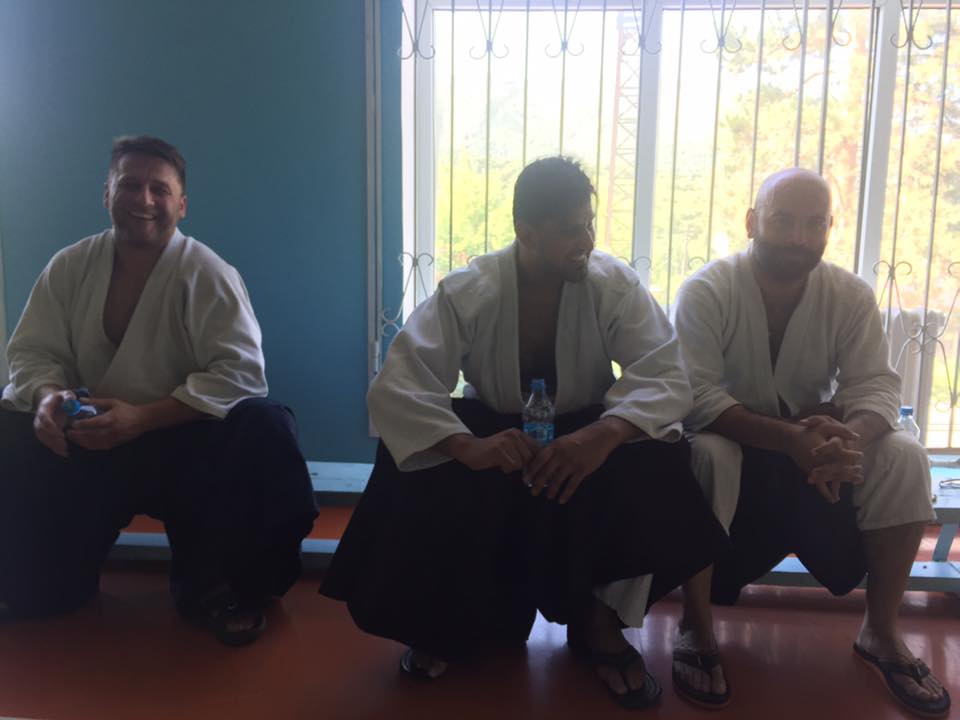
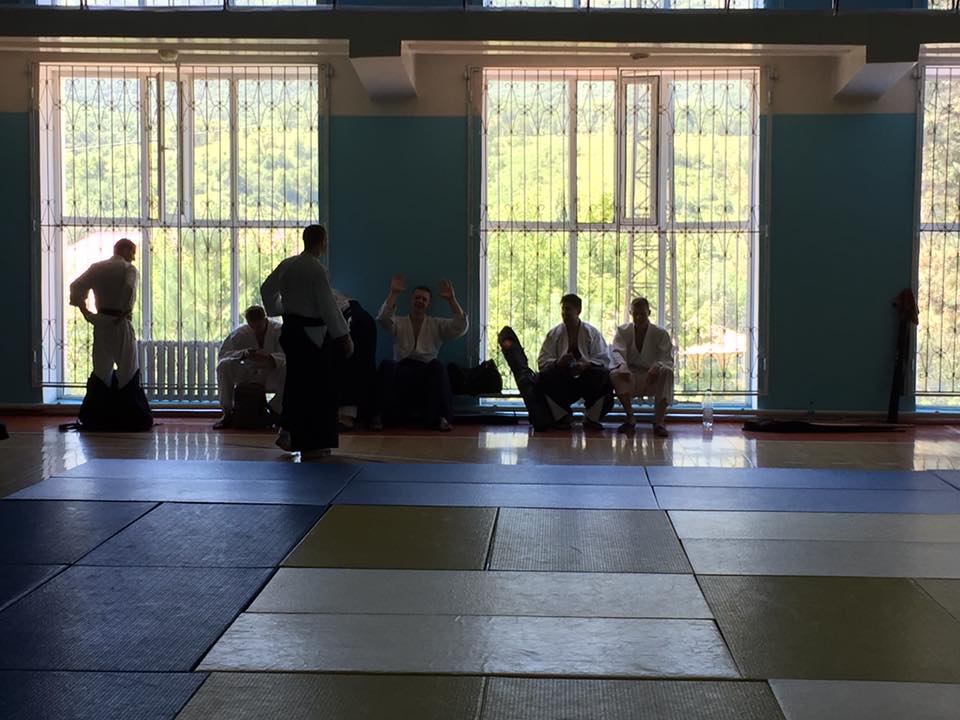
On the first night Yiannis, Fero, Anton, Sasha and I sit down outside relaxed and talk about anything. The Kazakhs tell us that in this country fighting is a part of life, it is what happens when you go out at night. Not necessarily out of animosity or crime, but just because that’s the way things are. Therefore, martial arts are on the rise, you must learn how to defend yourself. However, only real budo will survive as if the art isn’t effective they’ll know soon enough. Boxing, Karate and Judo are popular and have been for a long time – Aikido is just starting. Reflecting on this I have seen Sensei do some fancy things, big throws, which go round and round and round and up and down and round again, in the past. These are for conditioning at the dojo. At this seminar he was direct, as is the case in real life, they all were. Anton and Sasha’s warning is that Almaty night life is not a west-end musical, dancing doesn’t work. This is the reason Chiba Shihan’s method is so powerful here, it is practical; it is about surviving.
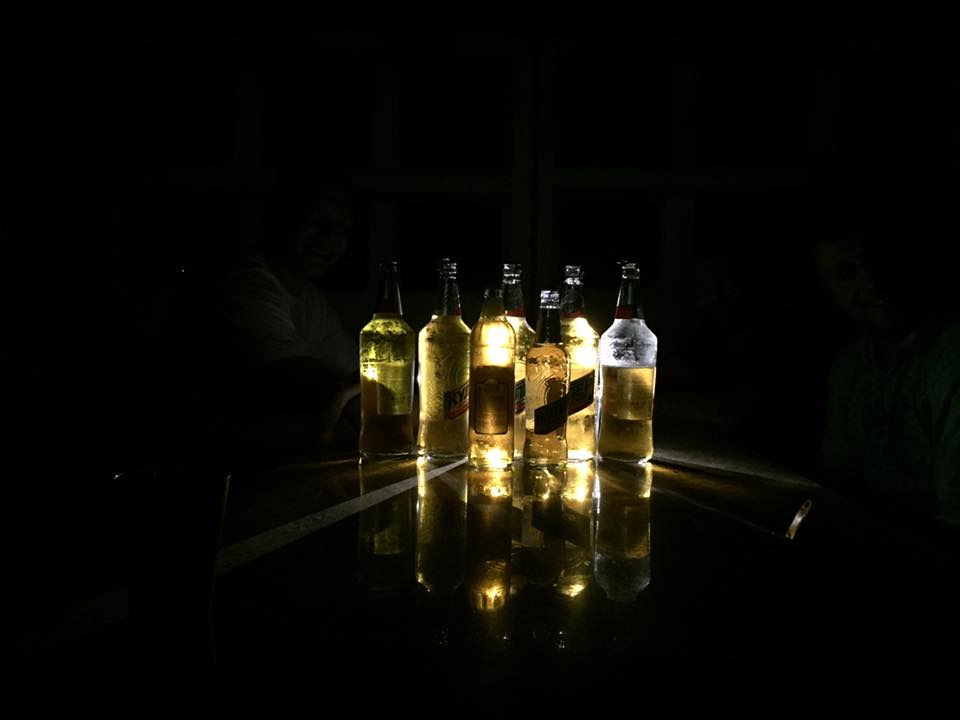
It is the end of the second day of seminar and we are going out. There is perhaps no better way to describe exactly where, other than the all-encompassing ‘out.’ We are in car for an hour driving away from the small town, which itself is four hours from the nearest city, and entering the wilderness. The grass is getting longer by the minute, the mountains steeper and the road rockier. In the distance, on an enormous plateau, we see a small collection of buildings. This is a slightly generous term as one of them was a tent, and the others were formed of wood and corrugated metal sheets. We are greeted by the master of the house.
The master is a short and old Kazakh with very dark skin and bright eyes. Less than five minutes elapsed between us entering his house and being ushered undressed into a closed hay strewn room which smells like strongly infused herbal tea. This is a Kazakh sauna, we are informed, the master runs it and anyone who is willing to make the trip is welcome. Sensei has been here before, he and the master meet like old friends. Sat on the wooden benches I am quite comfortable, it is a quite cold night so the room isn’t too warm. Then the master drips water on a collection of hot rocks in the corner of the room and I thought I was going to die. For ‘collection,’ read ‘two cubic meters;' for ‘drips’ read ‘poured.’
Thankfully the master goes around the group and runs cold water over heads so that we can survive another few minutes. I see that on the rocks he has various types of herbs which the steam flows through filling the air with a sweet and earthy aroma. The master doesn’t speak English, but we get the message, not least due to our translator, that two of us should lie down on the floor. We follow eagerly remembering that heat rises. It doesn’t last though as there are five of us in there and only two people fit on the floor at a time. Following this we are laid one at a time on a bench and then beaten with a leafy bushel which has sat atop the hot rocks and steamed thoroughly. I don’t know your experience when it comes to being hit with freshly steamed bushes, but let me just go as far as to say that there are more comfortable spa treatments. During the sauna, we are periodically told to go outside into the pool. This is a natural pool with diameter of two and half meters filled with crystal clear water, the terminus of a small river, just outside the hut. I remember walking past that pool on my way in and thinking it was cold then. It was cold – it was really cold.
After the treatment, we sat in a separate room and drank tea, beer, and cognac until there was none left whilst munching on a dry salty Kazakh cheese and the leftovers of the watermelon. More stories are traded and the master tells us about his experiences, and some of the people he has had come here. He once spent a whole week in a sauna himself. The singing starts, a song from each country, songs from Russia and Kazkhstan, from Sweden, Solvakia, Pakistan, Greece and, of course, Ireland with Molly Malone. There is nothing quite like the feeling of twelve or so men singing Russian songs of ire and love - songs which could break, or heal your broken bones.
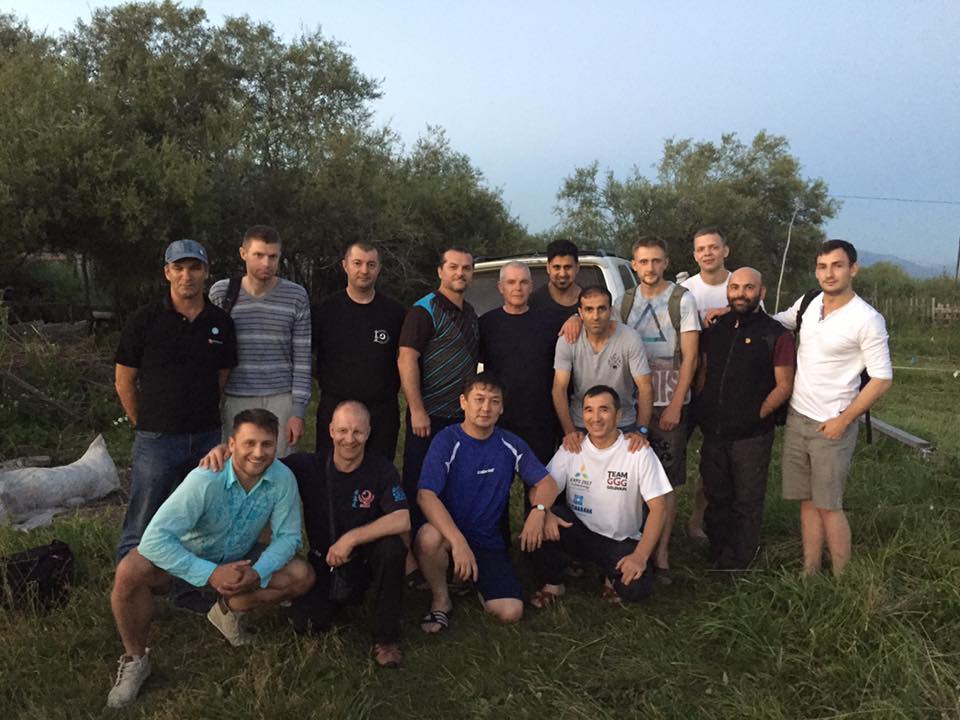
On the last evening of the seminar is the sayonara party. The food is exquisite with more lamb and some extraordinary traditional bread. It is a Japanese tradition that at the end of a seminar everyone gives a speech, and in honour the lineage of Aikido we observe this practice. However, it is a Russian tradition that after every speech you take a shot. This is a dangerous mix of cultures, and I don’t really know what happened next. I do recall that Sensei gave a speech about the families who support us crazy people that spend our lives trying to get somewhere in martial arts, and I recall speeches in honour of O-Sensei and Doshu, as well as Chiba Sensei.
We left.
As much as I want these characters to come to Europe, to Ei Mei Kan, the truth is most of them never will. Even if they could afford it, in many cases the border is closed to them as they are a former soviet state. In my bag, I have two passports, my national passport and my Birankai International passport. I have learnt that one is more powerful than the other, because where borders might be shut and distances overwhelming there is still Aikido, there still Birankai. In the next two years Birankai Kazakhstan is likely to be recognized by Hombu Dojo and we must do what we can to support the excellent work that is happening there. There are only four teachers, but their dedication to their student goes right back to Viktor Trusov Sensei who fed his just so that they could carry on training. I have no injunction or purpose in writing this, other than to tell you about the amazing people and incredible things that are happening there and I urge you to look at a map and simply try to point to Kazakhstan, and then remember these characters as I will.
Copyright © 2017 - All Rights Reserved - Ei Mei Kan